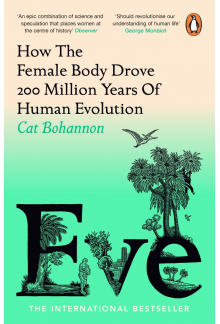Cat Bohannon
Eve
Voted 0
ISBN: 9781529156171
Author : Cat Bohannon
Published: 2024
Publisher: Penguin
Number of pages: 624
Language: English
Format: Paperback / softback
Format: 197×130
Author : Cat Bohannon
Published: 2024
Publisher: Penguin
Number of pages: 624
Language: English
Format: Paperback / softback
Format: 197×130
Price:
Whe don't have this product
Delivery in Lithuania within 3-6 weeks
Delivery in Lithuania within 1-4 working days. A few days delay is possible
Delivery in Lithuania within 3-6 weeks
Delivery conditions
Description
A NEW YORK TIMES BESTSELLERLONGLISTED FOR THE WOMEN'S PRIZE FOR NON-FICTION 2024FOYLE'S NON-FICTION BOOK OF THE YEAR 2023LONGLISTED FOR BLACKWELL'S NON-FICTION BOOK OF THE YEAR 2023ONE OF THE GUARDIAN'S BEST IDEAS BOOKS OF 2023ONE OF THE TELEGRAPH'S FIFTY BEST BOOKS OF 2023ONE OF PROSPECT'S BOOKS OF THE YEAR 2023ONE OF DUA LIPA'S SERVICE95 RECOMMENDATIONS FOR '5 INSPIRING READS TO KICK START THE NEW YEAR''Funny and very important' Chris van Tulleken, bestseling author of Ultra-Processed People'Educates and emboldens' Bonnie Garmus, bestselling author of Lessons in Chemistry'Should revolutionise our understanding of human life' George Monbiot, bestselling author of Regenesis'A vast and revolutionary history of female evolution' Sunday TimesHow did wet nurses drive civilization? Are women always the weaker sex? Is sexism useful for evolution? And are our bodies at war with our babies?In Eve, Cat Bohannon answers questions scientists should have been addressing for decades. With boundless curiosity and sharp wit, she covers the past 200 million years to explain the specific science behind the development of the female sex. Eve is not only a sweeping revision of human history, it's an urgent and necessary corrective for a world that has focused primarily on the male body for far too long. Bohannon's findings, including everything from the way C-sections in the industrialized world are rearranging women's pelvic shape to the surprising similarities between pus and breast milk, will completely change what you think you know about evolution and why Homo sapiens have become such a successful and dominant species, from tool use to city building to the development of language.
Reviews (0)
Write a review

